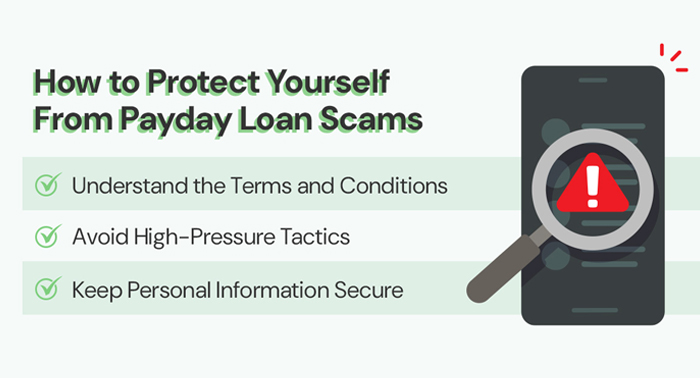
Dealing With Payday Loan Scams in California
Payday loans are a simple tool meant to ease short-term financial burdens. If you go over budget in a given month due to factors outside your control, a payday loan can help you make ends meet until your next paycheck, at which point you pay back the loan plus interest.
Millions of Americans use payday loans every year. This prevalence has led many scammers to adopt new tactics to exploit those looking for payday loans. To fight these scams off, it's important to understand what separates a legitimate lender from a scammer and how to protect yourself from the latter.
Types of Payday Loan Scams
Some common payday loan scams in California include:
- Phantom loans: The scammer sends you a message that claims you owe a fee for a loan you never took out.
- Fake lenders: The scammer impersonates a legitimate lender.
- Loan flipping: The scammer encourages you to take out more loans to pay off existing loans.
- Unlicensed lenders: The scammer offers loans without proper licensing from the state of California.
How to Verify if a Lender Is Legitimate
Part of recognizing scams is knowing what makes a lender legitimate. Below are some steps you can take to verify a lender and protect yourself from scams.
Research Lenders
In California, payday loan lenders must have a license from the Department of Financial Protection and Innovation (DFPI). This license means that they must adhere to the standards set by the California Deferred Deposit Transaction Law (CDDTL), one of the many California laws on payday loans. As a borrower, you should always verify a lender's license through the DFPI's search page before taking out a loan. You should also see if the DFPI has taken any enforcement actions or orders against the lender.
Review Credibility
Social proof is an excellent way to evaluate a lender. Try to find testimonials or reviews for the lender online. As you read, pay special attention to negative reviews. These can help you identify common issues other borrowers have and see if they're a pattern.
Reviews can be manipulated, however, so you should also see what the Better Business Bureau (BBB) says. There, you can find certifications and the lender's BBB ranking. These resources can better equip you to make healthy, informed choices about who you partner with.
Contact the Lender
In this day and age, legitimate lenders will have a website. You can use the information there to evaluate the lender's credibility. Be cautious if you notice strange details — odd formatting, inconsistent spelling or nonexistent contact information. These can be signs that the lender is trying to scam you.
If the website passes the eye test, you can contact the lender to verify terms and prices and ask questions. As a borrower, it is vital to know what you're getting into before taking out a loan. Talking with the lender can help you make that decision.
How to Protect Yourself From Payday Loan Scams
Now that you know how to verify a lender, let's look at some other practices to safeguard you from scams. You can employ these habits to protect your emotional and financial well-being in the face of suspicious loan offers.

Understand the Terms and Conditions
The first and perhaps most important thing you can do is pay attention. Before signing anything, read the terms and conditions and make sure you understand what they mean. If you don't know how interest or an annual percentage rate works, predatory lenders can take advantage of you. Staying informed is your first line of defense.
Avoid High-Pressure Tactics
The second thing you can do is take your time. If a lender is pressuring you to make a decision quickly, they should not be trusted. They are most likely trying to manipulate you, but remember, you are ultimately the one making the decision. If a lender bombards you with deadlines and legal threats, take a moment to recognize what they're doing and breathe. The worst thing you can do in this situation is panic and make the decision the scammer wants you to.
Keep Personal Information Secure
Another way to protect your money is to secure your personal information. Scammers are adept at “phishing,” where they send a message inviting you to click a dangerous link. For instance, you might receive a text saying your Amazon package will be delivered once you click a link and put in your address. Clicking the link actually allows the scammer to steal your information or download malicious software onto your phone. Scams like these stole around $330 million from American consumers in 2022.
When presented with messages like these, double-check the fine print. Company emails have very specific and intentional formatting. Checking things like the email address and the URL for anything suspicious can help you spot people trying to steal your information. As a baseline, you should always be suspicious of any link or message sent to you from an unknown source.
What to Do if You Encounter a Loan Scam
If you've become the victim of a scammer or suspect that you're in contact with one, don't panic or feel ashamed. These things can happen to anyone, no matter how smart or prepared they are. All you can do now is fight back.
Start by ceasing communication with the lender and refusing to make any more payments. Document all the interactions you've had with the lender so that you can refer back to them later.
Once you've gotten everything together, it's time to report the scam. According to the Federal Trade Commission (FTC), less than 10% of fraud victims actually report the fraud, which allows scammers to get away unscathed and puts more people at risk. In California, you can submit a complaint to the DFPI. Outside California, you can contact your local law enforcement. Wherever you are, you can file a report with the FTC.
The last step is to protect yourself from future harm. Contacting a financial counselor or credit counseling service can help you defend your identity and money if they've been compromised. In some cases, you may even be able to pursue legal action against the scammer.
Frequently Asked Questions
To give you additional information and peace of mind, we'll answer some common questions about payday loan scams.
We've discussed how to avoid payday loan scams, but how do you identify actively occurring ones? There are a few common warning signs that the lender you're interacting with is malicious:
- Unsolicited offers: They offer loans you never applied for.
- Offers that are too good to be true: They make outrageous claims that run counter to the market and their own business model.
- Upfront fees: They charge you before you receive the loan.
- A lack of transparency: Their terms and conditions are unclear or inconsistent.
If you notice one or several of these, you may be the target of a scam.
The availability of payday loans varies by state. In California, you can access these loans in person or online, but do your research before engaging with any lender to make sure they are ethical, licensed and trustworthy.
Yes, in most cases. Your Social Security number allows them to verify your identity and check your credit score. Some scammers may also want this information, however, so make sure the lender is legitimate before handing over any personal information.
Disclaimer
General Information Only – Not Legal, Financial, or Professional Advice
The information contained in this article is provided for general informational and educational purposes only and is not intended to constitute legal, financial, accounting, tax, investment, or other professional advice. The content is based on the author’s research and opinions as of July 25, 2025, and reflects conditions and data available at that time. Readers are strongly encouraged to consult with a qualified professional (e.g., attorney, financial advisor, accountant, or business consultant) licensed in their jurisdiction before making any decisions or taking any actions based on the information presented herein.
No Liability or Warranty
The author, [who written by], and any associated entities (including Cashbak, LLC) make no representations or warranties of any kind, express or implied, about the completeness, accuracy, reliability, suitability, or availability of the information, products, services, or related graphics contained in this article for any purpose. Any reliance you place on such information is strictly at your own risk. The author expressly disclaims all liability for any direct, indirect, incidental, consequential, special, exemplary, or punitive damages, including but not limited to loss of profits, data, or other intangible losses, arising out of or in connection with the use of or inability to use the information provided.
Not a Substitute for Professional Judgment
This article does not replace the need for professional judgment or individualized advice tailored to your specific circumstances, business, or legal obligations. Laws and regulations vary by state and change over time, and the information may not reflect the most current legal or financial standards in California or any other jurisdiction. Readers in California are particularly advised to comply with the California Business and Professions Code and consumer protection laws, including but not limited to the California Consumers Legal Remedies Act (Cal. Civ. Code § 1750 et seq.), which may impose additional disclosure or liability requirements.
No Endorsement or Guarantee of Results
The mention of any products, services, companies, or strategies in this article does not constitute an endorsement, recommendation, or guarantee of success. Results mentioned or implied (e.g., financial performance, business growth) are not typical and depend on numerous factors beyond the author’s control. Past performance is not indicative of future results.
Limitation of Liability
To the fullest extent permitted by applicable law, the author shall not be liable for any claims, lawsuits, damages, or losses, including those arising under tort, contract, or strict liability theories, resulting from the use or misuse of this article’s content. This disclaimer applies in all U.S. states and territories, subject to local laws that may impose mandatory liability (e.g., California’s Unfair Competition Law, Bus. & Prof. Code § 17200 et seq.).
Contact for Further Information
For personalized advice or clarification, contact a licensed professional in your area. The author is not responsible for providing ongoing support.


